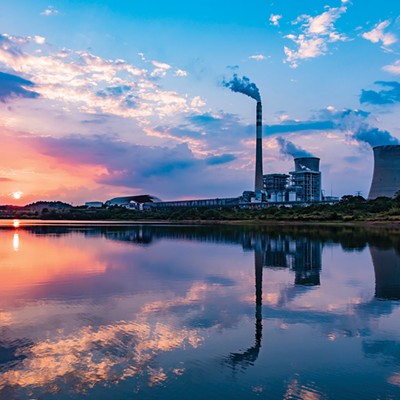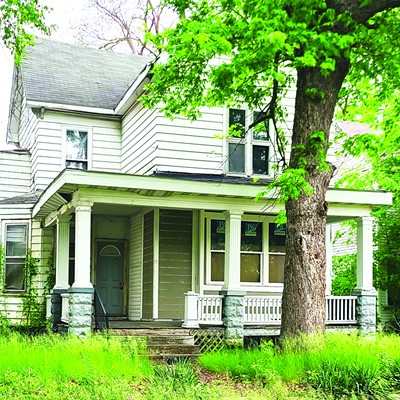Most people are familiar with the story of the Trojan Horse – the "gift" that disguised destruction, at least for Troy.
When legislators reconvene in the fall veto session, they will be confronted with a legislative Trojan Horse called SB76 – a pro-nuclear power bill which Gov. Pritzker wisely vetoed this past spring. Nuclear advocates want this veto overridden. The legislature should reject that plan.
SB76 ostensibly was an attempt to repeal Illinois' 1987 nuclear construction moratorium, put into effect to protect Illinois from uncontrolled radioactive waste production. The moratorium is a temporary, conditional halt – not a ban – conditioned on the federal government building an environmentally sound permanent disposal facility for the nation's now-90,000-plus tons of dangerous high-level radioactive wastes (HLRW) before Illinois will allow construction of new reactors to make more of it. This was supposed to be accomplished by 1997, a date and legal obligation the federal government missed, and has yet to meet. Consequently, Illinois has 11,000-plus tons of HLRW sitting onsite at nuclear plants, with no place for disposal.
Nuclear advocates have maligned the moratorium as "outdated" and "arbitrary." However, absent a federal nuclear waste disposal repository, the moratorium is clearly not "outdated;" and since no new reactors have added to Illinois' HLRW burden, it's not "arbitrary" – it's a success.
Pro-nuclear advocates introduced SB76 to promote "small modular nuclear reactors" (SMNRs), which are theoretical, untested "next-generation" nuclear power plant designs. It operated as a legislative Trojan Horse, ignoring HLRW, and instead promoting SMNR construction. This was explicit in SB76's introduction language, later amended inexplicably to remove that language. Then it was amended again at the 11th hour, substituting language promoting a totally different kind of reactor, resulting in the governor's veto.
Gov. Pritzker correctly feared it would "open the door to the proliferation of large-scale nuclear reactors that are so costly to build that they will cause exorbitant ratepayer-funded bailouts" and provide "no regulatory protections or updates to address the health and safety of Illinois residents."
Undeterred by such legislative ineptness and demonstrated ignorance of SMNRs, the pro-nuclear faction wants to override the governor's veto. As a precaution they have also introduced SB2591 using the original SB76 language promoting SMNRs.
The devil resides in the details, and SMNR details fill a sizable portion of Energy Hell. Hoopla about the alleged "benefits" of SMNRs are merely nuclear industry marketing promises and wishful thinking for one simple, yet vastly important reason – SMNRs do not even exist yet, and will not be available in commercially meaningful numbers until the mid-2030s, and then only if their proposed designs actually work.
SMNRs are touted to "strengthen our local economies, provide job stability, support local businesses, and augment the tax base, consequently bolstering funding for local schools," according to state Sen. Sue Rezin, R-Morris. However, Illinois is already reaping all of these benefits at currently existing renewable energy facilities, adding more as more renewables and later energy storage are built.
Pro-nuclear advocates claim we need SMNRs to fight climate change, a claim challenged by two former Nuclear Regulatory Commission chairs – Dr. Gregory Jaczko and Dr. Allison Macfarlane – who unequivocally state that, "Nuclear energy cannot be a near-term, or perhaps even medium-term, silver bullet for climate change. ... Nuclear energy will not be able to replace other forms of power generation quickly enough to achieve the levels of emission reduction necessary. ..." How can nonexistent reactors do that, compared to renewable energy resources that already do so?
Other worrisome SMNR devils not debated by the legislature include proposals to build SMNRs without protective containment buildings; eliminate emergency planning zones around reactors; and exemption from financial liability in case of accidents. Designs proposed would have fewer operators, plant personnel and even security staff, all to reduce costs (at the expense of safety?). So much for the "jobs engine" arguments. Per unit of power generated, they are predicted to cost more than today's already "bailed-out" reactors; and produce from 2 to 20 times more radioactive waste than current reactors, depending on the design.
SMNRs are proposed by an industry that can't build reactors on time; is rife with cost overruns; has recently endured three major nuclear-related corruption scandals (Ohio, South Carolina and Illinois); and already cannot compete in Illinois' energy market without needing $3.05 billion in ratepayer-guaranteed bailouts.
SMNRs will mean: more radioactive waste without disposal; continued radioactive emissions and accident threat; potential for higher electric rates and more nuclear bailouts. SMNRs are not "compliments" to renewable energy, but competitors to renewables, both for market share and for already constrained transmission grid access. Consequently, they threaten Illinois' renewable energy goals in the Climate and Equity Jobs Act.
If the legislature truly supports safe, renewable energy, it will not override the governor's veto of SB76; and will not support more nuclear plants in Illinois' energy future. We don't need Illinois to become Troy.



















